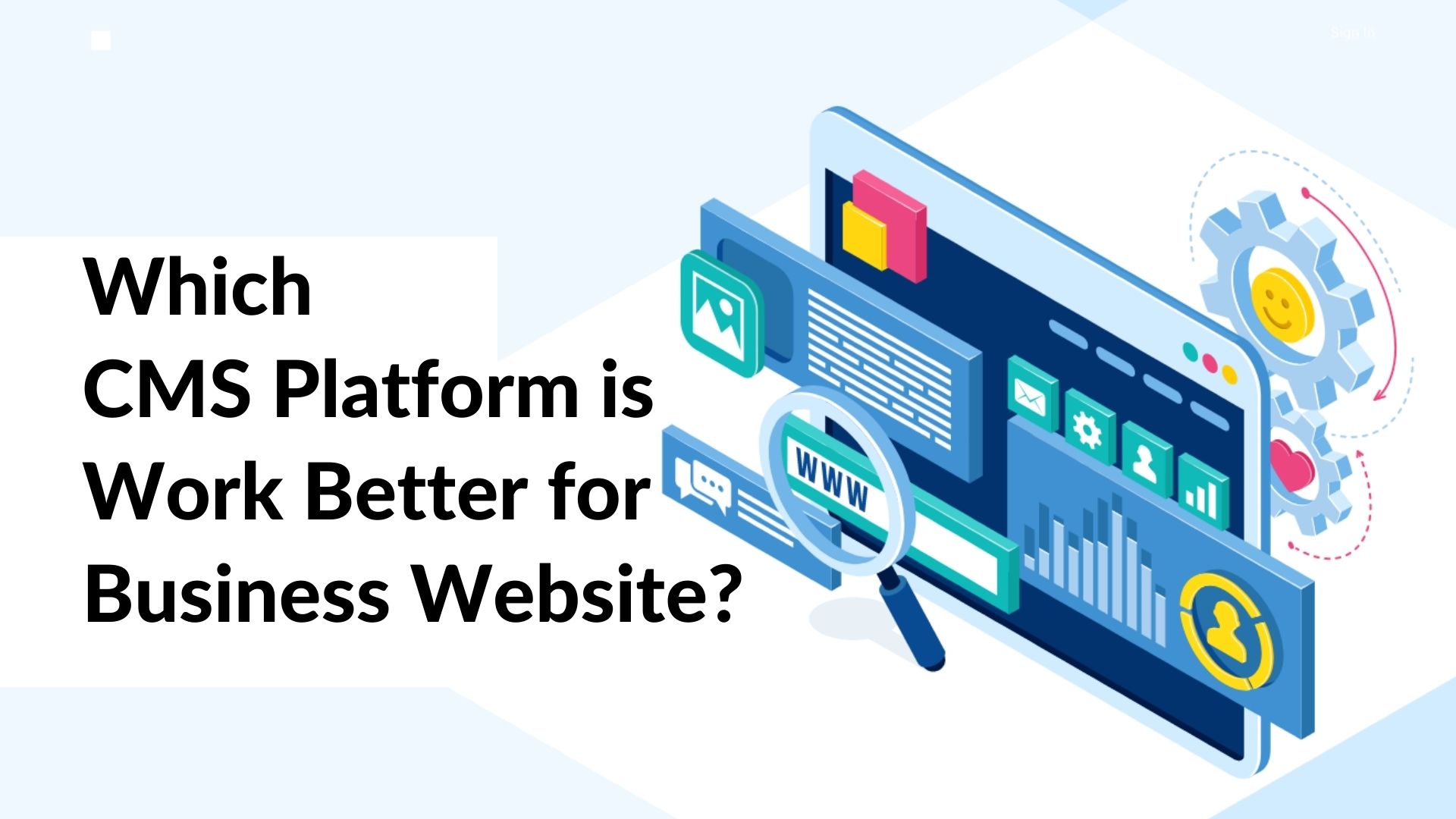Thinking about managing your business website with a CMS platform? WordPress, Wix, and many other options are available in the market. Now the question is, how do you pick one?
Content Management System (CMS) opens the door of maintaining a website without having any prior knowledge of programming. The best CMS for a website depends on its business purpose and service actions. First, you have to create a list of requirements to build a website or the digital presence of your business. Then, compare between CMS platforms to find the best and compatible one.
Before talking about existing CMS platforms, let’s see the importance of a CMS platform for business websites.
Why Do You Use A Content Management System (CMS)?
As we mentioned, a website is a digital presence for your business; it requires investment and effort. A website is one of the main communicating and data processing tools. Therefore, you want to ensure that people love and can measure the quality and consistency of service.
A content management system will reduce the pressure of managing the technical aspects of a website. However, it will save money and time, which you can use for other things for business expansion. Including these conceptual benefits, a CMS also contains the following advantages:
Easy Collaboration and Access
In a business, many people are working on or for several sections and projects. Input information on websites, for example, product pages, blog posts, marketing efforts, etc. requires a team effort.
A CMS platform lets your website accessible to multiple people and makes it collaborative for different projects. Also, CMS reduces the hassle of sending multiple files to different individuals. All things on the website are available and easily accessible to anyone in one place.
Efficient Maintenance and Security
Through this system, you can make changes to your site whenever you want. It’s much easier and quicker than traditional programming. CMS allows you to upload and update pages or posts within a few clicks. Wasting time to forward individually through pages of code to make a simple change, doesn’t seem efficient for business growth.
Behind every CMS platform, there are different levels and groups of developers and computer scientists who are instructed to protect their users from any security threats, and hackers. Moreover, there are lots of plugins and tools available to increase a website’s security performance.
Simple Design and Content Management
Upgrading the website to serve a flexible and functional interface includes changing the design. CMS makes it easier to change or improve the design without any hassle of coding. Also, this platform makes you able to change the administrative dashboard. It’s beneficial and great for branding. CMS also lets you customize the core management of every content. Starting from publishing content to updating or removing it after a certain time; everything requires a couple of clicks.
Advanced SEO and Controls
CMS offers plugins and tools to make your site capable of ranking higher in search engine result pages. Instead of these plugins, some CMS interfaces come with various essential SEO fields. For example, WordPress contains web page titles, meta descriptions, alt tags, image tags, and other effective elements. They’ll even notify you about the site’s performance on the dashboard.
All of this adds value to make the website a powerful tool for your business. With a CMS, you are the pilot of the jet. You can assign members, roles and keep track of their progression at any time from anywhere.
How to Choose the Right CMS Platform?
From this vast array of CMS service providers and solutions, choosing the absolute platform is not that easy. Now, it’s real that there is no such CMS that contains solutions for every situation. However, choosing and implementing a CMS can be a worthy investment that leverages your business. Otherwise, it could cost you dearly down the road.
Most people or businesses make mistakes when choosing a CMS which comes at a low cost but has less flexibility to operate and manage websites. Anyway, before selecting the right CMS platform, be concerned on following statements,
- Take a look at your expected CMS platform’s uses and compatibility. Many platforms reduce their functionality to make them easy to use. So while looking for solutions, make sure that the platform contains every feature and functionality that you need to meet business goals.
- Having a developer reliance to manage the technology won’t bring any benefit for your business. So, it is important to choose such CMS solutions that enrich the team’s focus on increasing web traffic. A platform that can quickly grow and scale as needed, creates more value for the long term.
- Find an omnichannel supported management system so that your site can perform better on desktop, mobile, digital assistants, and other several devices. Including these, find that CMS platform which has specific infrastructure for developers. Don’t limit your website to one code, let your developers put their strength and code in their preferred language.
- A CMS might contain everything that a website needs but without a support team it won’t be effective. As a business owner, you might never accept those services which have no one to contact while it is needed the most. So, to work without interruption or disturbance, find the worthiest one.
There are several factors to take into consideration while choosing a CMS platform for business. Including every element that a business website needs, the CMS needs to be compact and flexible to use for everyone. Some of the popular CMS platforms are Wix, Joomla, WordPress, Drupal, etc. Let’s talk about the most popular CMS platform, WordPress.
Is WordPress the best solution?
WordPress is one of the most used CMS platforms, also called blogging software. This compact system contains features and aspects for professional users and beginners. WordPress has thousands of free and premium themes, plugins, page builders that you can select to use. From blogging to online stores, WordPress is the efficient one for every type of site.
It’s specially designed to support blogging types of publishing. It also can contain full-service eCommerce Stores without any sort of disruption. According to the business website’s requirements, WordPress contains both free and premium plugins to solve those issues within a few clicks.
WordPress-powered sites perform better on Google and other search engines. This system is optimized for better mobile responses, which helps to leverage the site’s position to higher. As for being free and open-sourced, you’ll get support from various unofficial and local communities.
 If you want our recommendation, we definitely suggest you start with WordPress. We have many years of experience in using this platform and we’re completely satisfied, no doubt.
If you want our recommendation, we definitely suggest you start with WordPress. We have many years of experience in using this platform and we’re completely satisfied, no doubt.
Final Thought
All popular CMS platforms contain every basic thing and feature that you need to operate a site. Nowadays, you can’t perform best as only a business website owner. You must create and publish content according to business niches to drive traffic. So, using that platform which is really efficient and also popular among other professional users will be the best.
If you need any help related to WordPress, never hesitate to contact us.




![Read more about the article An Unknown Error Occurred WP All Export [Solved]](https://exertpro.com/wp-content/uploads/2023/02/An-Unknown-Error-Occurred-WP-All-Export-1-300x200.jpg)
